Filter by
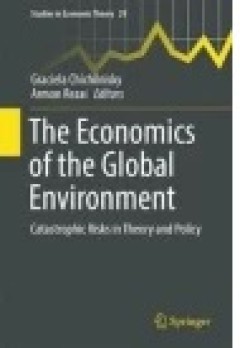
The Economics of the Global Environment
This is the first book combining research on the Global Environment, Catastrophic Risks and Economic Theory and Policy. Modern economic theory originated in the middle of the twentieth century when industrial expansion coupled with population growth led to a voracious use of natural resources and global environmental concerns. It is uncontested that, for the first time in recorded history, huma…
- Edition
- -
- ISBN/ISSN
- 978-3-319-31943-8
- Collation
- VII, 649
- Series Title
- Studies in Economic Theory
- Call Number
- -
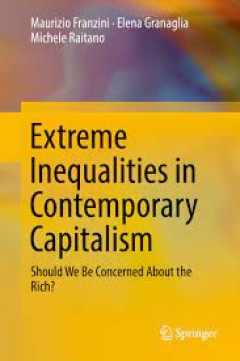
Extreme Inequalities in Contemporary Capitalism Should We Be Concerned About…
This book explores the mechanisms by which top incomes are achieved through work in today’s advanced economies and asks to what extent current extreme inequalities are compatible with widely held values of social justice. Reflecting on the heterogeneity of the working rich, the authors argue that very high earnings often result not from heightened competition induced by globalization but rath…
- Edition
- -
- ISBN/ISSN
- 978-3-319-28811-6
- Collation
- 13 b/w illustrations
- Series Title
- -
- Call Number
- -
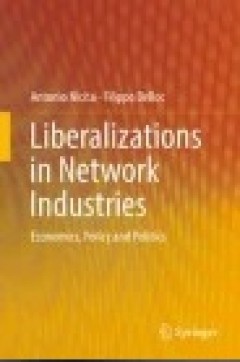
Liberalizations in Network Industries: Economics, Policy and Politics
This book explores the wave of liberalization reforms experienced by OECD network industries. Focusing on the telecommunications sector, the authors analyze the latest data available on liberalization and privatization, and following a political economics approach, they integrate standard economic analysis with the most recent studies of the political determinants of market-oriented policies. T…
- Edition
- -
- ISBN/ISSN
- 978-3-319-43717-0
- Collation
- -
- Series Title
- -
- Call Number
- -

Experimental Economics Volume II: Economic Applications
How do applications affect behavior? Experimental Economics Volume II seeks to answer these questions by examining the auction mechanism, imperfect competition and incentives to understand financial crises, political preferences and elections, and more.
- Edition
- -
- ISBN/ISSN
- 978-1-137-53816-1
- Collation
- XVIII, 220
- Series Title
- -
- Call Number
- -

Knowledge Capture in Financial Regulation: Data-, Information- and Knowledge-…
Eva Becker assesses the US financial crisis as a crisis of regulatory data, information and knowledge. Based on the Financial Crisis Inquiry Commission’s interviews as well her own interviews, and drawing on Capture Theory and recent reformulations thereof, she develops “knowledge capture” as a theoretic framework to assess financial regulation under conditions of 21st century complexity.
- Edition
- -
- ISBN/ISSN
- 978-3-658-13666-6
- Collation
- -
- Series Title
- -
- Call Number
- -
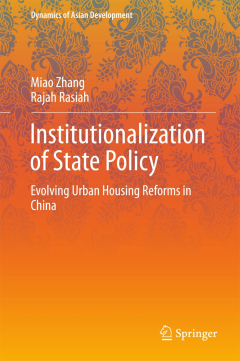
Institutionalization of State Policy
Using fresh evidence and a novel methodological framework, this book sheds light on how institutions have driven economic reform in China's urban housing sector. The book systematically analyzes the developmental role of the state in China, with rich empirical evidence to show how decentralization has brought about significant participation by the different levels of government with the central…
- Edition
- -
- ISBN/ISSN
- 978-981-287-569-3
- Collation
- XIII, 133
- Series Title
- -
- Call Number
- 330 ZHA i
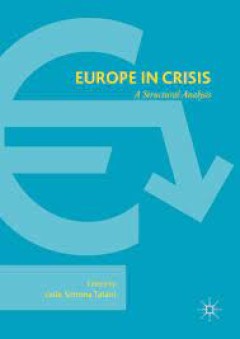
Europe in Crisis A Structural Analysis
With contributions from a range of expert scholars in European economics, politics and social policy, this edited collection analyses the crisis in Europe by exploring the structural asymmetries of the Economic and Monetary Union (EMU) and European monetary integration. Structured in two parts, the chapters in this book discuss the impact of the global financial crisis on the Euro area; the fai…
- Edition
- -
- ISBN/ISSN
- 978-1-137-57707-8
- Collation
- 2 b/w illustrations, 8 illustrations in colour
- Series Title
- -
- Call Number
- -
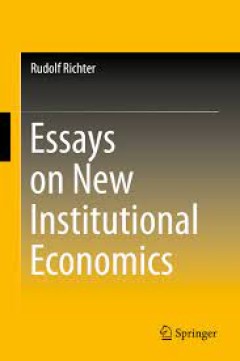
Essays on New Institutional Economics
This collection of essays comprises some of Rudolf Richter’s important contributions to research on New Institutional Economics (NIE). It deals with the central idea, principles, and methodology of New Institutional Economics and explores its relation to sociology and law. Other chapters examine applications of NIE to various microeconomic and macroeconomic issues in the face of uncertainty, …
- Edition
- -
- ISBN/ISSN
- 978-3-319-14154-1
- Collation
- 2 b/w illustrations
- Series Title
- -
- Call Number
- -

International Political Economy : An Introduction to Approaches, Regimes, and…
There are many books on international political economy, or IPE for short. Not surprisingly, each contains its own assumptions and views about the key concepts, issues, and concerns of IPE. Sometimes the authors of these various books hold the same assumptions and share the same, or at least very similar, views about how the world works. Sometimes they don’t. In fact, as we will see in a few …
- Edition
- -
- ISBN/ISSN
- -
- Collation
- -
- Series Title
- -
- Call Number
- 330 LIM i
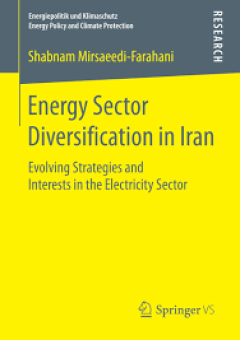
Energy Sector Diversification in Iran Evolving Strategies and Interests in t…
Shabnam Mirsaeedi-Farahani analyzes Iran’s interests in diversifying its energy sector, specifically electricity generation and consumption, between 1990 and 2011. She examines the policy discussions in the Iranian Parliament as well as policy development and implementation with respect to the electricity sector. One of the geopolitically crucial areas for both Iran’s domestic development a…
- Edition
- -
- ISBN/ISSN
- 978-3-658-11284-4
- Collation
- 52 b/w illustrations, 33 illustrations in colour
- Series Title
- -
- Call Number
- -
 Computer Science, Information & General Works
Computer Science, Information & General Works  Philosophy & Psychology
Philosophy & Psychology  Religion
Religion  Social Sciences
Social Sciences  Language
Language  Pure Science
Pure Science  Applied Sciences
Applied Sciences  Art & Recreation
Art & Recreation  Literature
Literature  History & Geography
History & Geography